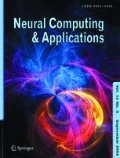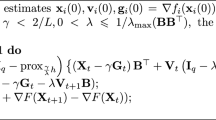Abstract
In this paper, a novel online iterative scheme, based on fuzzy adaptive dynamic programming, is proposed for distributed optimal leader-following consensus of heterogeneous nonlinear multi-agent systems under directed communication graph. This scheme combines game theory, adaptive dynamic programming together with generalized fuzzy hyperbolic model (GFHM). Firstly, based on precompensation technique, an appropriate model transformation is proposed to convert the error system into augmented error system, and an exquisite performance index function is defined for this system. Secondly, on the basis of Hamilton–Jacobi–Bellman (HJB) equation, the optimal consensus control is designed and a novel policy iteration (PI) algorithm is put forward to learn the solutions of the HJB equation online. Here, the proposed PI algorithm is implemented on account of GFHMs. Compared with dual-network model including critic network and action network, the proposed scheme only requires critic network. Thirdly, the augmented consensus error of each agent and the weight estimation error of each GFHM are proved to be uniformly ultimately bounded, and the stability of our method has been verified. Finally, some numerical examples and application examples are conducted to demonstrate the effectiveness of the theoretical results.



















Similar content being viewed by others
References
VanDyke M, Hall C (2006) Decentralized coordinated attitude control within a formation of spacecraft. J Guidance Control Dyn 29(5):1101–1109
Wu J, Han D, Liu K et al (2015) Nonlinear suboptimal synchronized control for relative position and relative attitude tracking of spacecraft formation flying. J Frankl Inst 352(4):1495–1520
Shahbazi B, Malekzadeh M, Koofigar H (2017) Robust constrained attitude control of spacecraft formation flying in the presence of disturbances. IEEE Trans Aerosp Electron Syst 53(5):2534–2543
Jiang Y, Wang H, Wang S (2019) Distributed H\(\infty\) consensus control for nonlinear multi-agent systems under switching topologies via relative output feedback. Neural Comput Appl 31(1):1–9
Cai Y, Zhang H, Zhang K et al (2019) Distributed leader-following consensus of heterogeneous second-order time-varying nonlinear multi-agent systems under directed switching topology. Neurocomputing 325:31–47
Miao G, Ma Q, Liu Q (2016) Consensus problems for multi-agent systems with nonlinear algorithms. Neural Comput Appl 27(5):1327–1336
Sun Q, Han R, Zhang H et al (2015) A multiagent-based consensus algorithm for distributed coordinated control of distributed generators in the energy internet. IEEE Trans Smart Grid 6(6):3006–3019
Abdulghafor R, Abdullah S, Turaev S et al (2018) Linear and nonlinear stochastic distribution for consensus problem in multi-agent systems. Neural Comput Appl. https://doi.org/10.1007/s00521-018-3615-x
Wang B, Chen W, Wang J et al (2018) Cooperative tracking control of multiagent systems: a heterogeneous coupling network and intermittent communication framework. IEEE Trans Cybern 99:1–13
Cui B, Zhao C, Ma T et al (2016) Leader-following consensus of nonlinear multi-agent systems with switching topologies and unreliable communications. Neural Comput Appl 27(4):909–915
Deng C, Yang G (2019) Distributed adaptive fault-tolerant control approach to cooperative output regulation for linear multi-agent systems. Automatica 103:62–68
Chen C, Ren C, Du T (2016) Fuzzy observed-based adaptive consensus tracking control for second-order multiagent systems with heterogeneous nonlinear dynamics. IEEE Trans Fuzzy Syst 24(4):906–915
Zhang J, Wang Z, Zhang H et al (2018) Data-based optimal control of multiagent systems: a reinforcement learning design approach. IEEE Trans Cybern. https://doi.org/10.1109/TCYB.2018.2868715
Qiu Z, Liu S, Xie L (2016) Distributed constrained optimal consensus of multi-agent systems. Automatica 68:209–215
Morris P (2012) Introduction to game theory. Springer Science and Business Media, New York
Vamvoudakis K, Lewis F, Hudas G (2012) Multi-agent differential graphical games: online adaptive learning solution for synchronization with optimality. Automatica 48(8):1598–1611
Wei Q, Liu D, Lewis F (2015) Optimal distributed synchronization control for continuous-time heterogeneous multi-agent differential graphical games. Inf Sci 317:96–113
Sun J, Liu C (2018) Distributed zero-sum differential game for multi-agent systems in strict-feedback form with input saturation and output constraint. Neural Netw 106:8–19
Al-Tamimi A, Lewis F, Abu-Khalaf M (2008) Discrete-time nonlinear HJB solution using approximate dynamic programming: convergence proof. IEEE Trans Syst Man Cybern B (Cybern) 38(4):943–949
Bertsekas D (2017) Value and policy iterations in optimal control and adaptive dynamic programming. IEEE Trans Neural Netw Learn Syst 28(3):500–509
Wei Q, Liu D, Lin H (2016) Value iteration adaptive dynamic programming for optimal control of discrete-time nonlinear systems. IEEE Trans Cybern 46(3):840–853
Gao W, Jiang Y, Davari M (2019) Data-driven cooperative output regulation of multi-agent systems via robust adaptive dynamic programming. IEEE Trans Circuits Syst II Express Briefs 66(3):447–451
Zhang H, Liang H, Wang Z et al (2017) Optimal output regulation for heterogeneous multiagent systems via adaptive dynamic programming. IEEE Trans Neural Netw Learn Syst 28(1):18–29
Liu L, Wang Z, Zhang H (2018) Data-based adaptive fault estimation and fault tolerant control for MIMO model-free systems using generalized fuzzy hyperbolic model. IEEE Trans Fuzzy Syst 26(6):3191–3205
Zhang H, Wang Z, Li M et al (2004) Generalized fuzzy hyperbolic model: a universal approximator. ACTA Autom Sin 30(3):416–422
Yang Z, Zhang H (2018) A fuzzy adaptive tracking control for a class of uncertain strick-feedback nonlinear systems with dead-zone input. Neurocomputing 272:130–135
Ferrari-Trecate G, Galbusera L, Marciandi M et al (2009) Model predictive control schemes for consensus in multi-agent systems with single-and double-integrator dynamics. IEEE Trans Autom Control 54(11):2560–2572
Song R, Lewis F, Wei Q et al (2016) Off-policy actor-critic structure for optimal control of unknown systems with disturbances. IEEE Trans Cybern 46(5):1041–1050
Wang W, Chen X (2018) Model-free optimal containment control of multi-agent systems based on actor-critic framework. Neurocomputing 314:242–250
Zhang H, Feng T, Yang G et al (2015) Distributed cooperative optimal control for multiagent systems on directed graphs: an inverse optimal approach. IEEE Trans Cybern 45(7):1315–1326
Zhao W, Li R, Zhang H (2017) Leader-follower optimal coordination tracking control for multi-agent systems with unknown internal states. Neurocomputing 249:171–181
Yasini S, Sitani M, Kirampor A (2016) Reinforcement learning and neural networks for multi-agent nonzero-sum games of nonlinear constrained-input systems. Int J Mach Learn Cybern 7(6):967–980
Chen K, Wang J, Zhang Y et al (2015) Consensus of second-order nonlinear multi-agent systems under state-controlled switching topology. Nonlinear Dyn 81(4):1871–1878
Wang A, Liao X, Dong T (2018) Event-driven optimal control for uncertain nonlinear systems with external disturbance via adaptive dynamic programming. Neurocomputing 281:188–195
Zhang H, Yue D, Zhao W et al (2018) Distributed optimal consensus control for multiagent systems with input delay. IEEE Trans Cybern 48(6):1747–1759
Das A, Lewis F (2010) Distributed adaptive control for synchronization of unknown nonlinear networked systems. Automatica 46(12):2014–2021
Murray J, Cox C, Lendaris G et al (2002) Adaptive dynamic programming. IEEE Trans Syst Man Cybern Part C (Appl Rev) 32(2):140–153
Surhone L, Timpledon M, Marseken S et al (2010) Weierstrass theorem. Betascript Publishing, Riga
Vamvoudakis K, Lewis F (2010) Online actor-critic algorithm to solve the continuous-time infinite horizon optimal control problem. Automatica 46(5):878–888
Wang D, Liu D, Li H (2014) Policy iteration algorithm for online design of robust control for a class of continuous-time nonlinear systems. IEEE Trans Autom Sci Eng 11(2):627–632
Dong B, Zhou F, Liu K et al (2018) Decentralized robust optimal control for modular robot manipulators via critic-identifier structure-based adaptive dynamic programming. Neural Comput Appl. https://doi.org/10.1007/s00521-018-3714-8
Zhang H, Cui L, Luo Y (2013) Near-optimal control for nonzero-sum differential games of continuous-time nonlinear systems using single-network ADP. IEEE Trans Cybern 43(1):206–216
Liang Y, Zhang H, Xiao G et al (2018) Reinforcement learning-based online adaptive controller design for a class of unknown nonlinear discrete-time systems with time delays. Neural Comput Appl. https://doi.org/10.1007/s00521-018-3537-7
Yang X, Liu D, Wei Q et al (2016) Guaranteed cost neural tracking control for a class of uncertain nonlinear systems using adaptive dynamic programming. Neurocomputing 198:80–90
Khalil H (2002) Nonlinear systems, 3rd edn. Prentice-Hall, Englewood Cliffs
Mei J, Ren W, Ma G (2013) Distributed coordination for second-order multi-agent systems with nonlinear dynamics using only relative position measurements[J]. Automatica 49(5):1419–1427
Ren W (2008) Synchronization of coupled harmonic oscillators with local interaction. Automatica 44(12):3195–3200
Du H, He Y, Cheng Y (2014) Finite-time synchronization of a class of second-order nonlinear multi-agent systems using output feedback control. IEEE Trans Circuits Syst I Reg Pap 61(6):1778–1788
Modares H, Lewis F, Kang W et al (2018) Optimal synchronization of heterogeneous nonlinear systems with unknown dynamics. IEEE Trans Autom Control 63(1):117–131
He Q, Wang X, Lei Z et al (2019) TIFIM: A Two-stage iterative framework for influence maximization in social networks. Appl Math Comput 354(1):338–352
Acknowledgements
This work was supported by the National Natural Science Foundation of China (61433004, 61627809, 61621004), and IAPI Fundamental Research Funds 2013ZCX14.
Author information
Authors and Affiliations
Corresponding author
Ethics declarations
Conflict of interest
The authors declare that there are no financial and personal relationships with other people or organizations that can inappropriately influence our work. And there are no potential conflicts of interest with respect to this work.
Additional information
Publisher's Note
Springer Nature remains neutral with regard to jurisdictional claims in published maps and institutional affiliations.
Rights and permissions
About this article
Cite this article
Cai, Y., Zhang, H., Zhang, K. et al. Fuzzy adaptive dynamic programming-based optimal leader-following consensus for heterogeneous nonlinear multi-agent systems. Neural Comput & Applic 32, 8763–8781 (2020). https://doi.org/10.1007/s00521-019-04263-0
Received:
Accepted:
Published:
Issue Date:
DOI: https://doi.org/10.1007/s00521-019-04263-0




